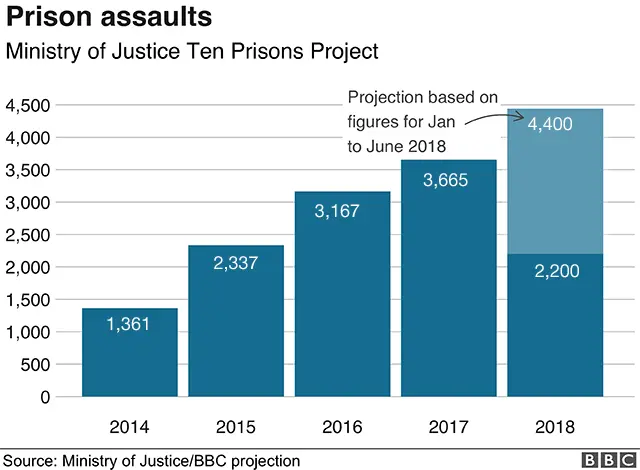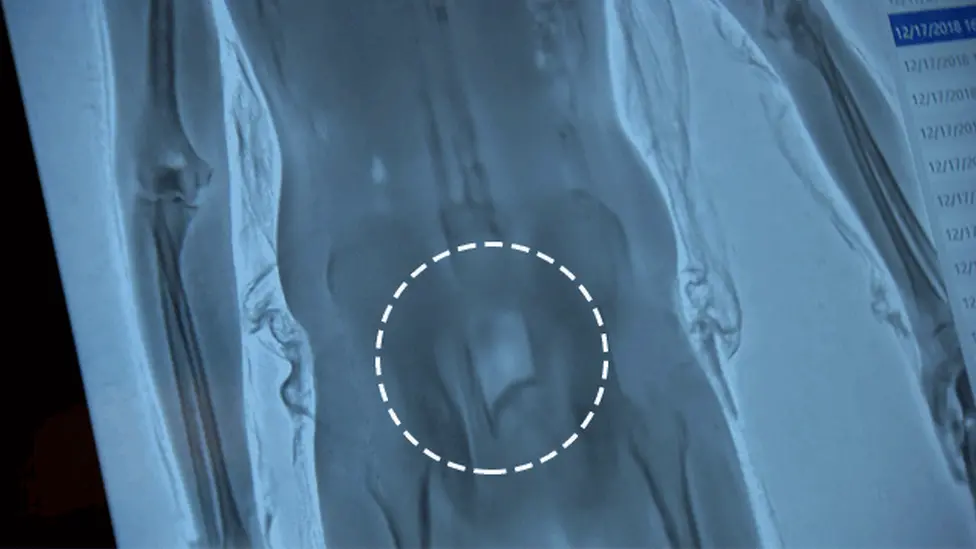Criminal gangs apply for jail jobs to smuggle drugs, say police
Police say there is growing evidence that members of organised criminal gangs are getting prison service jobs to smuggle banned items.
A senior officer has told the BBC he has "strong suspicions" this is happening, but links are hard to prove.
Ministers admit it "can happen" but say better search techniques will help.
An "X-ray" body scanner to detect drugs has been installed at Leeds jail, one of 10 where ministers aim to cut drug-fuelled violence by the summer.
Prisons minister Rory Stewart says he's "cautiously optimistic".
In August he said he would resign if the 10 prisons did not improve within a year under a £10m programme to improve their security and living conditions.
The programme also includes building repairs, better perimeter security and the use of sniffer dogs at the jails which the Ministry of Justice has identified as having "acute problems" with high drug use, violence and poor buildings.
"I believe we can do it," Mr Stewart told the BBC in December. "We've got early indications in some of these prisons we're beginning to get a grip on it."
The 10 prisons are Hull, Humber, Isis, Leeds, Lindholme, Moorland, Nottingham, Ranby, Wealstun and Wormwood Scrubs.
Official figures, analysed by BBC News, show that the number of assaults has increased steadily since 2014 and was projected to increase last year in all the jails except Nottingham and Wormwood Scrubs.

However, Mr Stewart acknowledged some jails might try to reduce assaults simply by moving dangerous offenders to other establishments.
"That's definitely a risk. I'm very, very clear, though, we need to play this fair. The idea is that I can look other governors in the face and say: 'We turned around these ten prisons without cheating. '"
Police believe the drugs trade in jails is co-ordinated by organised crime groups.
Assistant Chief Constable Jason Hogg, who leads on prison intelligence for the National Police Chiefs' Council, said he "strongly suspects" gangs are getting their associates or family members jobs in the prison service with the intention of smuggling contraband in, although it was difficult to prove.
'Less than 1%'
ACC Hogg said he was unaware of any cases where people caught with contraband in prison had been "forthcoming" about their links to organised crime - but added there were examples of people getting jobs within the prison staff and then being recruited by criminals.
Speaking to BBC Radio 4's Today programme, Mark Fairhurst, of the Prison Officers Association, said there was evidence both prison officers and civilian staff were employed by criminal gangs around the UK, but that those people accounted for "less than 1%" of prison staff.
He added the use of X-ray body scanners was "vital" in the battle against drugs in prisons.
However, a former prison inmate, who identified himself only as David, told Today that drugs were a "reality of prison life".
He added: "No matter what kind of security, if somebody wants a drug they will get a drug."

Reality Check: Which banned goods are making their way into prisons?
In the year ending March 2018, there were 51,993 incidents of contraband being found in prisons in England and Wales.
The largest group was drugs, with 13,119 seizures in the year - this has tripled since 2010.
In a third of cases the drug was a psychoactive substance, such as spice. Very few cases (408) involved the most serious Class A drugs, which include cocaine and heroin.
Nearly 11,000 illicit mobile phones and 5,000 SIM cards were also found.
There were almost 19,000 cases of seizures classed as 'other', a category which includes tobacco, alcohol, distilling equipment, weapons and "other reportable items".
Source: Ministry of Justice

Mr Stewart said searching was the "answer" to the problem of corruption.
"Searching, not just in terms of finding a bad apple, but also if you have very good search procedures in place, it's much more difficult for a prisoner to put pressure on a prison officer," he said.
HMP Leeds is the first of the 10 prisons to have installed an X-ray scanner to detect packages hidden inside a prisoner's body. The scanner, which costs about £120,000, operates in a similar way to a standard hospital X-ray machine - but the level of radiation is 400 times lower.
A prisoner will be scanned only when intelligence indicates they may be carrying drugs - up to a maximum of 50 times a year.

Prison staff at Leeds believe the X-ray scanner will act as a "game changer" in the battle to stop drugs getting in but the governor, Steve Robson, warned that offenders were adept at finding other methods, even smuggling new psychoactive substances (PS), such as Spice into their clothes or clothes worn by prison visitors.
"They have been soaking clothes in drugs and then either smoking bits of cut up clothing or then using the kettles boiling the drugs out and impregnating them back into the paper," said Mr Robson.
"We found lots of bits of dressing gown that we tested that came back very high for PS and fitted in with the intelligence that had happened so we started swabbing all the clothes."
He said it was a game of "cat and mouse".
"You close one avenue and the more ingenious will think of other ways of doing things," he said.
